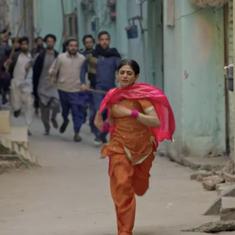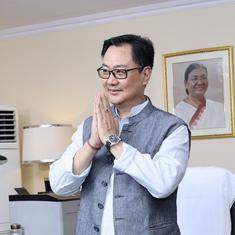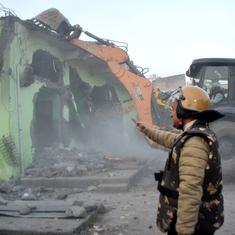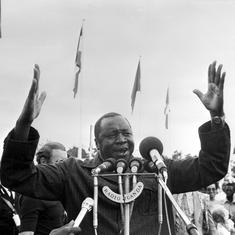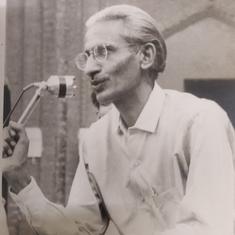There’s a place called the AIFF Football House in New Delhi. It stands today as a monument to the lack of common sense and empathy towards the very people it exists to serve. Why, it’s the home of the All India Football Federation, of course, the country’s governing body for football whose actions and decisions make so little sense at times that you are obligated to double-check whether or not the AIFF is actually just a parody of its real self.
What else can you expect looking at a non-profit federation which owes money to clubs and players but could still afford to offer cash prizes to medal-winning Olympians from different sports, just to earn a few brownie points? Or one which could appoint Babul Supriyo, playback singer-turned Bharatiya Janata Party minister, as the vice-president of the FIFA Under-17 World Cup organising committee without any basis other than him being a “football fan” and a “friend” of the AIFF President Praful Patel?
AIFF’s decision to not only host the Federation Cup in Cuttack, Orissa but to schedule it from May 7-21 in an inhumane, congested manner is just the latest in a growing list of choices which betray any semblance of intelligence or understanding of the sport.
Inhuman
Temperatures in Cuttack have reached as high as 42 degree Celsius in the afternoon – at roughly around 3 PM. This was a well-known fact. Yet, the tournament, which started only a week after the end of a hectic I-league season, has seen two matches daily at 4 PM and 7 PM.
“It comes down to a lack of respect for the players,” says Scottish coach Stevie Grieve, formerly the Head Coach at the Bhaichung Bhutia Football Schools in addition to being a well-known football pundit on Indian television.
Federation Cup games have been great so far. Pity half of them are in 40+ degree heat. Can't be good with the congestion of fixtures on top
— Saahil D (@BhagArjunBhag) May 8, 2017
“Maintaining a high standard of play in 40-plus degrees is something even the fittest players with the best support systems in the world would struggle at.”
Remember the global outrage over the 2022 World Cup in Qatar, a place where temperatures would reach 50 deg. Celsius in the summers? It had forced FIFA to shift the tournament to the winter season, during which the weather is far more pleasant.
AIFF, though, keeps getting away with perplexing decisions because of the lack of popularity of Indian football. It gets away with virtually no accountability towards players and clubs.
An exhausting experience
Playing in such heat is one thing but scheduling matches on alternate days quite another. With a recovery time of less than 48 hours between matches, players and teams have been suffering. Semi-finalists have played four matches in a span of seven or eight days – a schedule which only has a place in college tournaments, not professional ones.
Some clubs, such as Bengaluru FC, who couldn’t afford the luxury of resting players in their final group match with semi-final positions still up for grabs, have fielded full-strength teams for four matches in a row. It’s an exhausting experience which has claimed its first major victim in BFC and national team skipper Sunil Chhetri, whose muscle tear means he will not only miss the rest of the competition and vital AFC Cup ties for BFC but also be absent for the national team’s crucial Asian Cup qualifier against Kyrgyzstan. It’s a big blow indeed.
This has drawn the ire of BFC CEO Parth Jindal, who wrote to AIFF officials questioning the “thought process” behind the Federation Cup schedule and delivered a stern verdict in saying the “whole purpose of advertising Indian football is defeated”. It must be said that if all the clubs had foreseen this and protested earlier when the fixtures were first announced in March, we could’ve been looking at a different story. Unity and foresight is missing across the board.
— Parth Jindal (@ParthJindal11) May 13, 2017
“To reduce the risk of injury, you need around 72 hours to recover from the previous game,” Grieve says. “Players being asked to ‘peak’ every 48 hours not only increases risk of injury but forces them to play to a standard far below their best.”
Defies footballing logic
BFC, in fact, played its semi-final against Aizawl FC less than 48 hours after finishing their previous match whereas the I-League champions had an extra day’s rest. “One team with 24 hours more recovery time has approximately 60% higher chance of winning due to the extra recovery period,” the Scot estimated. That BFC still ground out a 1-0 result to reach the final is testament to its modern methods, which are far more advanced than that of AFC.
To play the entire competition at only one venue defies simple footballing logic too. It meant that the final group matches were not played simultaneously, which increases the chances of match-fixing or collusion but definitely gives one team a clear advantage.
Choosing Cuttack as the venue for #HeroFedCup shows AIFF's total apathy towards the sport in the country.#PrafulPatelMustResign
— football news india (@fni) May 12, 2017
For instance, by the time BFC kicked off their final group game versus Mohun Bagan, the team knew it needed only a draw to seal a place in the semis – and duly earned a 1-1 result.
Lack of thinking and planning is commonplace with the AIFF and there seems to be no end in sight. As an example, in 2014, the Group A matches of I-League’s 2nd division were played in Dhanbad, Jharkand – a choice that still baffles the Scottish coach.
“To host five professional teams in a high-pollution area with no training facilities, hotels or anything to keep players entertained was disgraceful,” recollects Grieve, who was in Dhanbad at the time as the Head Coach of Delhi’s second division club Garhwal FC.
“How can you put the tournament in an area where there’s no culture for football? Training fields had cow dung and four-inch high grass and even the goal size and shape was incorrect.”
The process of selection of a venue is dubious in itself. State associations bid, or show willingness, to host the competition following which the final venue is decided. Not everyone has been on board with Cuttack as the venue. As per sources, most senior AIFF officials are embarrassed with this choice, which suggests that the decision has indeed come right from the top.
It is remarkable that India will be hosting the U-17 FIFA World Cup in less than five months. Ironically, that event will be trumpeted as a major sign of footballing progress by a federation that is yet to get the very basics of football right.
Akarsh Sharma is a sports traveller and writer who contributes to various publications. His work is collated on akarshsharma.com and he occasionally tweetshere.
